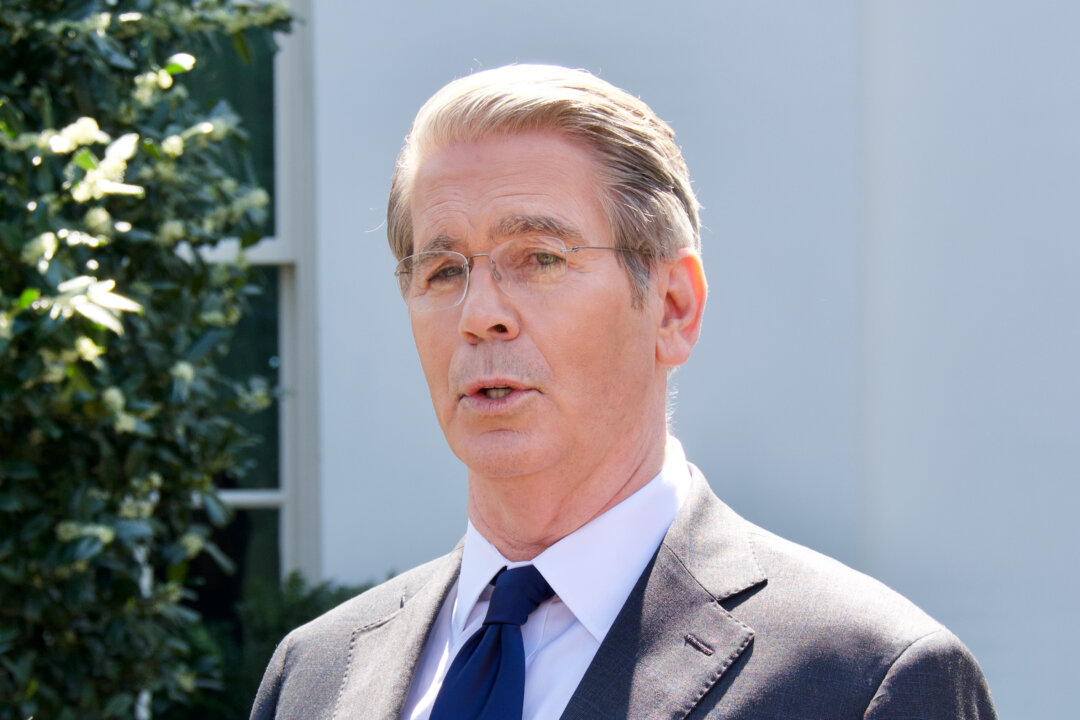‘America First does not mean America alone,’ the Treasury secretary said in prepared remarks.
The United States will support changes to the International Monetary Fund (IMF) and the World Bank to secure economic and financial sustainability, Treasury Secretary Scott Bessent said on Wednesday.
Bessent laid out his vision for the twin institutions and America’s involvement, pledging to bolster its leadership role as it pursues reforms to “restore equilibrium to the global financial system.”
“America First does not mean America alone,” the Treasury chief said in prepared remarks at an April 23 event hosted by the Institute of International Finance.
“We must enact key reforms to ensure the Bretton Woods institutions are serving their stakeholders, not the other way around.”
He stated that while the IMF and World Bank possess “enduring value,” they have engaged in “mission creep” that has “knocked these institutions off course.”
“The IMF and World Bank serve critical roles in the international system. And the Trump Administration is eager to work with them, so long as they can stay true to their missions,” Bessent said.
“Today’s IMF has been whistling past the graveyard.”
In recent years, rather than concentrate on worldwide monetary cooperation and financial stability, the IMF has devoted more time and resources to sprawling subjects, such as climate, gender, and social issues.
“These issues are not the IMF’s mission,” Bessent said. “The IMF’s focus in these areas is crowding out its work on critical macroeconomic issues. … We must make the IMF the IMF again.”
A chorus of U.S. officials has lamented these international organizations’ policies, prompting the administration to extensively review U.S. participation in all international intergovernmental organizations and foreign assistance programs.
Since President Donald Trump returned to the White House, there have been growing concerns that the president would withdraw the United States from the IMF, which would transform the share of voting rights.
The United States currently enjoys a 16 percent share of voting rights, followed by Japan (6 percent), China (6 percent), and Germany (5 percent).
Others, including Bank of England Governor Andrew Bailey, say that a U.S. withdrawal would result in a “fragmentation of the world economy.”
“A big part of that is that we have support and engagement in the multilateral institutions, institutions like the IMF, the World Bank, that support the operation of the world economy. That’s really important,” Bailey said in a February interview with the BBC.
The IMF has forecast slower U.S. and global economic growth. In its latest World Economic Outlook report, the Washington-based institution projected that global growth will ease to 2.8 percent in 2025, down from 3.3 percent in 2024. U.S. economic growth is expected to slow to 1.8 percent this year from 2.8 percent last year.
Economists have attributed the slowdown to Trump’s sweeping tariff agenda.
“The swift escalation of trade tensions and extremely high levels of policy uncertainty are expected to have a significant impact on global economic activity,” the report stated.

Bessent used his address to encourage the World Bank to stop lending to countries with advanced economic growth, highlighting China.
He told the audience that treating the world’s second-largest economy as a developing nation is absurd.
“The World Bank continues to lend every year to countries that have met the criteria to graduate from World Bank borrowing,” Bessent said.
“There is no justification for this continued lending. It siphons off resources from higher priorities and crowds out the development of private markets. It also disincentivizes countries’ efforts to move away from dependency on the World Bank and toward job-rich, private sector-led growth.”
The World Bank maintains a graduated borrowing system that depends on lending terms and conditions tailored to countries’ economic and credit status. Low-income economies, for example, will receive favorable lending terms, such as longer repayment schedules and lower interest rates.
Despite its status as the world’s second-largest economy, the World Bank has defended its lending practices to China because of its development setbacks, from regional disparities to environmental challenges.
The senior administration official noted that while China’s economic progress has been “rapid and impressive,” it has been at the expense of Western economies.
“If China wants to play a role in the global economy commensurate with its actual importance, then the country needs to graduate up,” Bessent said.
He also encouraged China to participate in a global rebalancing, echoing a previous sentiment that Beijing should concentrate on domestic demand while the United States boosts its manufacturing prowess.
“Intentional policy choices by other countries have hollowed out America’s manufacturing sector and undermined our critical supply chains, putting our national and economic security at risk,” he said.
China’s influence in the twin institutions has greatly expanded over the past decade.
World Bank economists published a 2023 paper stating that China has become a lender of last resort in the global economy.
The Chinese communist regime has provided rescue loans to countries facing financial trouble. These loans generally have high interest rates and are given almost exclusively to debtor nations in China’s Belt and Road Initiative (BRI).
“In sum, China has developed a system of ‘Bailouts on the Belt and Road’ that helps recipient countries to avoid default, and continue servicing their BRI debts, at least in the short run,” the paper stated. “China’s role as an international crisis manager can therefore be compared to that of the US Treasury during previous Latin American debt crises.”
The IMF’s growth forecast for China in 2025 is 4 percent, a 0.6 percentage point drop from its previous estimate.

